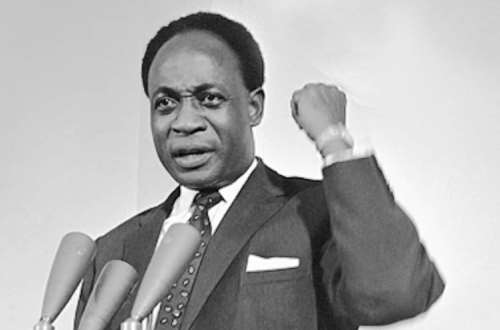Nkrumah Never Dies: Ghanaians Celebrate 114 Years Of Osagyefo Dr Kwame Nkrumah’s Birth
Ghanaians from all walks life, the diaspora and indeed the black race are celebrating the life of Africa’s man of the millennium, the Osagyefo Dr Kwame Nkrumah for the remarkable legacies he has left in the sands of time.
Ghana’s minister of Interior, Ambrose Dery in a statement declared Thursday, September 21, 2023, as a statutory public holiday dubbed Nkrumah Memorial Day.
Osagyefo Dr Kwame Nkrumah, Ghana’s first President was born on September 21, 1909, at Nkroful, near Axim in the Nzema East Municipality in the Western Region of the then Gold Coast, now Ghana.
September 21, 2023 would have marked the 114th birthday of Dr Nkrumah if he were alive.
The date in the past was marked as Founder’s Day in memory of the man who led the country to independence, the first in the sub-region setting the pace for all other Africa counties in the independence struggle from colonial rule.
Internal Ghanaian partisan politics led the two major political parties, the New Patriotic Party (NPP) and the National Democratic Congress (NDC) to become sharply divided over the acceptance of Nkrumah as the founder of modern Ghana and his birthday marked as Founder’s Day as against those who argue that there are a lot of people who contributed to the liberation struggles therefore should be part of the founders’ of Ghana hence the Founders’ Day.
This disagreement resulted in the change of the Founder’s Day celebration from September 21 under the NDC regime to now August 4 (the day on which the bond of 1844 was signed0 as Founders Day under the current NPP regime.
Be that as it may, Africa and the world still celebrate the Osagyefo as one visionary leader who was far ahead of his peers in terms of thought and deeds.
The huge statue of Kwame Nkrumah in front of the African Union (AU) headquarters is enough testimony to his stature.
Osagyefo Dr Kwame Nkrumah is still remembered for his vision for Ghana and Africa, most of which are still relevant today as it was then,
The beacon of progress and development in just six-years as president of Ghana from 1960 to 1966 championed the establishment of several institutions and projects that continue to shape the destiny of the country today.
These footprints are scattered along the length and breath of the country cutting across all sectors of the economy as a true definition of progress and development.
Industrial Growth
A wave of industrialization initiatives that laid the foundation for Ghana’s economic strength marked Nkrumah’s presidency. His focus on creating self-reliance and reducing dependency on imports resulted in the establishment of several key enterprises:
- Abosso Glass Factory: Nkrumah’s push for local manufacturing led to the creation of the Abosso Glass Factory, a symbol of self-sufficiency in producing glass products.
- Akosombo Dam and Akosombo Textiles Limited: Nkrumah’s dedication to harnessing Ghana’s resources led to the construction of the Akosombo Dam, which not only provided electricity but also spurred the growth of industries like Akosombo Textiles Limited, contributing to local employment.
- Asutuare Sugar Factory and Buokrom Estate: Nkrumah’s agricultural focus birthed the Asutuare Sugar Factory and the Buokrom Estate, boosting sugar production and providing housing for workers.
- Bolgatanga Meat Processing Factory: Nkrumah’s commitment to value addition in agriculture led to the establishment of the Bolgatanga Meat Processing Factory, promoting local meat processing.
- Bolgatanga Rice Mill Factory: Nkrumah’s pursuit of food security materialized in the creation of the Bolgatanga Rice Mill Factory, boosting domestic rice production.
- Kade Match Factory: Under his visionary leadership, the Kade Match Factory emerged, contributing to local production and reducing import dependency.
Educational Institutions
Nkrumah recognized that education was pivotal for a nation’s progress. He established institutions that continue to shape the country’s intellectual landscape:
- Accra Polytechnic (Now Accra Technical University): This institution’s evolution into Accra Technical University remains a testament to Nkrumah’s commitment to technical education.
- Ajumako School of Languages (Now Under UEW): By creating Ajumako School of Languages, Nkrumah paved the way for language studies, contributing to cultural preservation.
- Kwame Nkrumah University of Science and Technology (KNUST): This renowned institution stands as a monument to Nkrumah’s emphasis on science and technology education.
- University of Cape Coast (UCC): The establishment of UCC expanded educational opportunities along the coast, promoting higher learning.
- Enchi Training College: Nkrumah’s emphasis on education extended to teacher training, exemplified by the establishment of Enchi Training College.
- Fosu Training College: The creation of Fosu Training College bolstered teacher education and improved the quality of education.
- University of Ghana (University College of Gold Coast): The expansion of this institution into the University of Ghana underscores Nkrumah’s dedication to higher learning.
- Ghana Medical School: His commitment to healthcare and medical education found expression in the establishment of Ghana Medical School.
- Techiman Secondary School: Nkrumah’s focus on expanding educational access is evident through institutions like Techiman Secondary School.
Infrastructure and Urban Development
Nkrumah’s presidency saw the transformation of Ghana’s urban landscape, with projects that continue to define its modernity:
- Kumasi Central Hospital (Now Komfo Anokye Teaching Hospital): Nkrumah’s investment in healthcare is evident in the expansion of this hospital, ensuring quality medical care for Ghanaians.
- Korle Bu Teaching Hospital: The expansion of Korle Bu, with specialized blocks, demonstrated Nkrumah’s commitment to healthcare excellence.
- Tema Township and Tema Motorway: Nkrumah’s vision for a modern industrial city materialized in the establishment of Tema Township and the Tema Motorway, linking Accra and Tema for efficient transport.
- Kumasi Jute Factory and Kumasi Shoe Factory: These initiatives contributed to industrial growth, providing quality jute products and footwear to Ghanaians.
- City Hotel Catering Rest Houses (Now Golden Tulip – Kumasi): The transformation of this facility into Golden Tulip Hotel demonstrates Nkrumah’s commitment to hospitality infrastructure.
- Patasi Estate: Nkrumah’s vision for planned housing resulted in the creation of Patasi Estate, catering to urban housing needs.
- Meridian Hotel: The establishment of Meridian Hotel highlighted Nkrumah’s efforts to enhance tourism infrastructure.
Financial and Economic Fortitude
Nkrumah’s legacy in the financial sector is palpable through the establishment of key institutions:
- Bank of Ghana (BoG): The BoG’s foundation during Nkrumah’s time remains the backbone of Ghana’s financial system.
- Ghana Commercial Bank (GCB): Nkrumah’s efforts resulted in the establishment of GCB, facilitating financial access and stability.
- National Investment Bank (NIB): The NIB’s creation reflects Nkrumah’s foresight in fostering investment and economic growth.
- Ghana Black Star Line: Nkrumah’s endeavors in the maritime sector included the establishment of the Ghana Black Star Line, fostering shipping and trade.
- Ghana News Agency: The creation of this agency strengthened media and communication networks, supporting national development.
- GIHOC Pharmaceuticals: Nkrumah’s focus on pharmaceuticals led to the establishment of GIHOC Pharmaceuticals, contributing to healthcare access.
Cultural and Creative Progress: Nurturing Identity
Nkrumah recognized the significance of culture and creativity in national identity and growth:
- Ghana Film Industries – Accra and Ghana Film Corporation: These institutions nurtured Ghana’s film industry, fostering cultural expression and creative entrepreneurship.
- Institute of African Studies: Nkrumah’s commitment to preserving and studying African heritage is evident in this institute’s founding.
- State Farm Institutes: Nkrumah’s agricultural innovation extended to State Farm Institutes, promoting modern farming techniques.



No Comment! Be the first one.